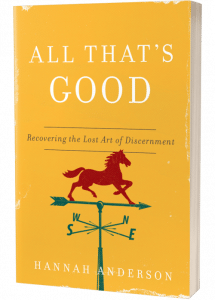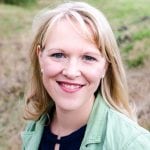I always like to know a little something about an author before I sit down and open up his or her book. Today, I have the pleasure of sharing a sneak peek interview with Hannah Anderson, an author I always enjoy reading. Ever since I heard that she was writing this book, All That’s Good: Recovering the Lost Art of Discernment, I’ve been on the edge of my seat waiting to get a copy. It’s an important topic in the church today, and it released this week. Hannah always writes with a combination of depth and wisdom as she weaves together ideas and words in a beautiful way.
Can you tell us a little bit about yourself?
I live in the Blue Ridge Mountains of southwest Virginia with my husband, Nathan, and our three children aged 9 to 14. Nathan pastors a small country church, and I split my time between helping him, caring for our family, and writing and speaking.
When did you first start writing? What do you enjoy about it?
I didn’t start writing seriously until my early 30s, which was about seven years ago. Growing up, I loved books and ideas, but never attempted writing anything besides school assignments and the occasional essay competition (which I entered invariably for the prizes). My senior year of college, I took a writing class because I enjoyed the professor, and one day, he casually mentioned that students getting below a certain average might need to reconsider their hopes of a writing career. It took me off guard because I was getting well above that average and had never even considered writing as a profession. Until that moment, I simply didn’t have category that included both “Hannah” and “writer” in it.
I enjoy writing because it gives me permission to get lost in my thoughts and chase an idea down to completion. So much of daily life is composed of what Tish Harrison Warren calls “the liturgy of the ordinary”—that necessary, albeit never ending, work of keeping ourselves and those we love alive. Writing, by contrast, gives me the chance to work on projects that have a definite beginning and end. I also like the clarity that writing brings. If there’s something I don’t quite understand, I’ve discovered that the surest way to figure it out is to write about it.
Is writing ever difficult for you? How so?
For me, the most difficult part of writing is being honest. It’s not that I’m tempted to write things that are untrue; it’s that writing provides an unusual opportunity for self-awareness and reflection. When you put words down on a paper and read them back to yourself, you have to ask, “Do I really believe what I’ve just written? Is this truth in both fact and expression?” So writing has a way of uncovering your insecurities, doubts, and prejudices, and when it does, you have to decide what to do with them. Are you going to face them and deal with them? Or are you going to simply barrel through and write whatever will garner affirmation and applause? For me, writing is a significant part of God’s sanctifying work in my life, and it can be tempting to bypass it. But when I let it do what it’s supposed to do, it also keeps me honest.
What led you to write All That’s Good: The Lost Art of Discernment?
 I don’t know about you, but I’ve found the digital age extremely disorienting. At first, the internet was a welcome source of information and connection. Eventually, it opened a way for me to work from home. But things have changed dramatically in the last decade, and today the online experience feels like a constant cycle of disinformation, relational conflict, and image crafting—all things that hinder good decision making.
I don’t know about you, but I’ve found the digital age extremely disorienting. At first, the internet was a welcome source of information and connection. Eventually, it opened a way for me to work from home. But things have changed dramatically in the last decade, and today the online experience feels like a constant cycle of disinformation, relational conflict, and image crafting—all things that hinder good decision making.
I don’t think the digital age has made us any more or less gullible than previous generations; but we do have to grapple with more information than they did. And we’re doing it in an environment that prioritizes trending movements over trusted institutions and celebrity voices over trained professionals. In other words, while our lack of discernment is not unique in history, the need for discernment might be.
What’s the central message you hope readers will take away from your book?
Learning to make wise decisions cannot be separated from becoming wise people. Too often we approach the topic of discernment as if it were a matter of simply learning the right steps, staying within certain tribal boundaries, or finding the “truer” facts. But discernment is more about becoming the kind of people who can make good decisions because we are being made good by God. Or as Romans 12 puts it, discernment comes from having our minds renewed and transformed.
Also, I want readers to see discernment as a fundamentally hopeful process that’s predicated on God’s goodness. After all, we can only learn the difference between good and bad if we believe goodness exists in the first place. To be truly discerning, we must start with a belief that God is good, that he made the world good, and that despite our sinfulness, he has not abandoned us.
For a sneak peak, here are some quotes from the book:
In 1 Timothy, Paul writes that “everything created by God is good, and nothing is to be rejected if it is received with thanksgiving, for it is made holy by the word of God and prayer” (4:4 ESV). Paul is not suggesting that we can indulge in anything we want as long as we pray over it; he’s teaching how a posture of thanksgiving and submission to God’s Word puts us in a place to know God through His gifts. From this posture, we acknowledge that all good things come down from Him, that without Him, we would have nothing. We submit ourselves to His plans and purposes for our lives, even if they run counter to what the world tells us will bring happiness. And we confess that He is our ultimate good.
Designed to live in community, human beings process information and come to decisions in what Alan Jacobs calls “necessarily, thoroughly, and wonderfully social” ways. This can be hard to admit, especially for those of us who like to imagine ourselves independent thinkers. We can see how other people are influenced. When they offer an opinion, we think to ourselves: Well, of course, you think that. Just look where you get your news. Look at what church you go to. Look at your family background . . . But when we have an opinion, somehow we believe we reached it independently, through nothing but sheer, unassailable logic.
The truth is that the leaders we follow, the communities we’re part of, and the organizations we support all play a role in shaping the decisions we make. That’s why Proverbs predicts that “the one who walks with the wise will become wise, but a companion of fools will suffer harm.” . . . The fact that discernment comes in and through community also means that we should be suspicious of people who refuse to submit themselves to the accountability of community or who posture themselves as having a corner on truth. If someone is teaching or saying something that no one else is, there’s usually a reason for that. And it’s rarely good.
Here’s what others are saying about All That’s Good:
“I’ve always seen discernment as a basically negative thing: make sure you don’t embrace something bad. Hannah Anderson has convinced me that it is a positive thing: make sure you do embrace what is good. This book, like the biblical text it centers on, is good, true, honourable, excellent and praiseworthy. Buy it, read it, and think about such things!” – Andrew Wilson, Teaching Pastor at King’s Church London
“Once again, Hannah Anderson has written a book that not only points readers toward the good, the true, and the beautiful, but is all of these things as well. This book recovers life-giving, joy-generating applications of the Christian faith that have been lost for generations to the spirits of fear and enmity that have come to define the relationship of many believers to God’s good world. Anderson’s reminder to “taste and see” the goodness of God all around us is a welcome invitation for us all.” – Karen Swallow Prior, author of On Reading Well: Finding the Good Life through Great Books
“When the topic of discernment arises, I get nervous. Maybe you do, too. Many of us have been on the receiving end of the well-intended comments of others, offered in the name of godly discernment. With the Bible as her steady guide, Hannah Anderson points us toward good definitions and good practices to help us obey the command to be people who know how to discern rightly. I’m so grateful for this clarifying book.” – Jen Wilkin, author and Bible teacher
If you had an afternoon to do whatever you’d like, where would we find you?
The older I get, I want to be at home more and more. So you’d probably find me in my kitchen trying out a new recipe, watching a favorite movie with my kids, or reading in quiet chair. Or napping. There’s a good chance you’d find me napping.
 Hannah Anderson is an author and speaker who lives in the Blue Ridge Mountains of Virginia. Her previous books include Made for More: An Invitation to Live in God’s Image and Humble Roots: How Humility Grounds and Nourishes Your Soul. You can find more of her writing at sometimesalight.com, hear her on the weekly podcast Persuasion, or follow her on Twitter @sometimesalight.
Hannah Anderson is an author and speaker who lives in the Blue Ridge Mountains of Virginia. Her previous books include Made for More: An Invitation to Live in God’s Image and Humble Roots: How Humility Grounds and Nourishes Your Soul. You can find more of her writing at sometimesalight.com, hear her on the weekly podcast Persuasion, or follow her on Twitter @sometimesalight.


















